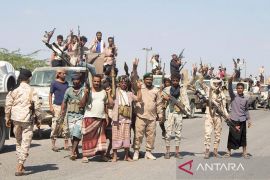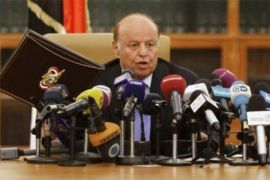Saleh has said al Qaeda militants could fill a political and security vacuum if he is forced out and, in a televised speech on Sunday, blamed the opposition for the deal`s collapse.
"If (Yemen) is engulfed in a civil war, they will be responsible for it and the bloodshed," he said.
The deal would have made Saleh the third long-entrenched leader ousted by popular protests buffeting the Arab world since January.
The United States and Saudi Arabia, both targets of foiled attacks by al Qaeda`s Yemen-based regional wing, are keen to end the Yemeni stalemate to avert a spread of anarchy that could give the global militant network more room to thrive.
The failure of intense diplomatic efforts to secure a deal came after armed Yemeni government loyalists trapped Western and Gulf ambassadors -- serving as mediators in the crisis -- for hours in an embassy in Sanaa before they left by helicopter.
"It failed," a diplomat told Reuters after the deal fell through at the last minute, for the third time. Diplomats said five members of the ruling party signed the deal, but Saleh refused, demanding additional conditions.
The Gulf Cooperation Council bloc of Yemen`s wealthy oil-exporting neighbours that spearheaded the deal may withdraw its initiative as a result, a Gulf diplomat said.
The deal would have given Saleh immunity from prosecution, ensuring a dignified exit after nearly 33 years at the helm of the Arabian Peninsula state, located on a shipping lane through which 3 million barrels of oil pass every day.
"Saleh is not serious about getting out of power. And this is part of his strategy to remain in charge," Dubai-based security analyst Theodore Karasik said, adding that the 69-year-old ruler was no longer seen as a trusted partner.
"He might be able to hang on, but the pressure from outside is going to be so intense now that it could be his days are numbered," he added.
More than 170 Yemeni protesters have been killed in a crackdown on demonstrations, part of the wave of pro-democracy uprisings across North Africa and the Middle East that swept aside the leaders of Tunisia and Egypt.
In a move likely to infuriate Yemen`s Gulf and Western allies, gunmen loyal to Saleh surrounded a Gulf embassy, trapping diplomats working to resolve the crisis and blocking them from heading to the presidential palace to see Saleh.
Witnesses said Gulf Cooperation Council Secretary-General Abdullatif al-Zayani, who was at the forefront of the talks, was stranded for hours along with the U.S. ambassador and several European envoys in the United Arab Emirates embassy compound.
The UAE urged Yemeni authorities to secure its embassy, state media said, and the diplomats were later said to have left by helicopter. A U.S. embassy spokeswoman could not immediately be reached for comment.
"We reject signing the Gulf initiative and the coup against legitimacy," some pro-Saleh demonstrators shouted from their cars over loudspeakers elsewhere in Sanaa, while others piled up stone barricades to block traffic.
U.S. President Barack Obama said in a speech on U.S. policy in the Arab world on Thursday that Saleh needed to "follow through on his commitment to transfer power". European diplomats have also leaned on both sides to agree on a deal.
Yemen`s opposition, representing a coalition that includes Islamists and leftists, had already signed the transition deal on Saturday after indications from Gulf mediators that Saleh would sign a day later.
But diplomats said Saleh demanded opposition officials appear in person to sign the agreement, again, in his presence. The opposition said it had already signed and would not comply.Zayani left the country shortly after Saleh refused to sign.
The opposition is under pressure to avoid further compromises from youth-led street protesters -- including students and tribesmen -- who seek Saleh`s immediate exit and who have vowed to continue daily rallies until Saleh quits.
Tens of thousands of protesters rallied peacefully on Sunday across Yemeni cities to keep up the pressure. They have threatened to step up their campaign by marching on government buildings, a tactic that led to more bloodshed this month when security forces opened fire to stop them.
Two opposition tribesmen were shot dead on Sunday in the countryside surrounding Sanaa, and seven others were wounded, when they tried to block presidential guards from moving in the area, an opposition official said.
Strikes have also brought commerce to a halt in many cities and protests have created fuel shortages in a country already in turmoil -- Yemen faces revolts from Shi`ite rebels in the north and separatists in the south. (*)
Editor: Kunto Wibisono
Copyright © ANTARA 2011



